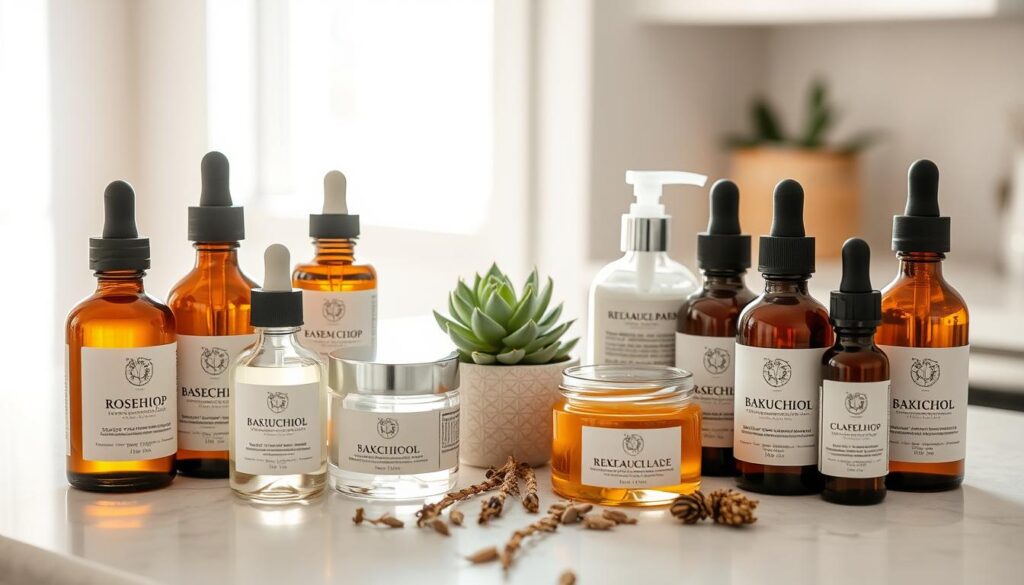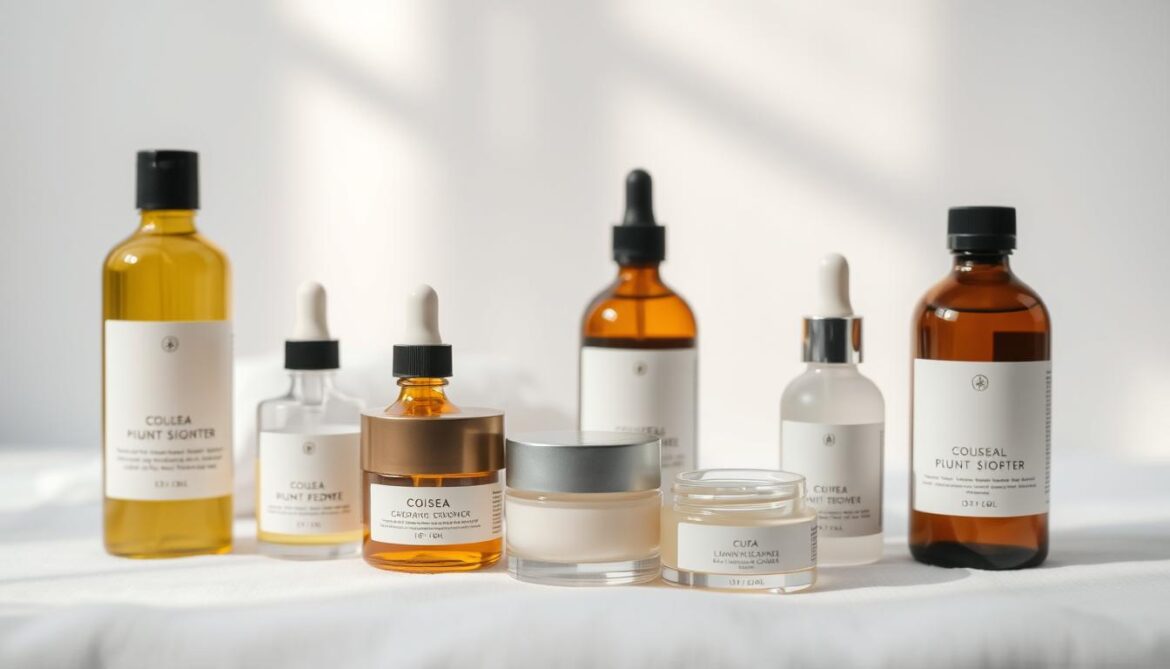Not everyone’s skin can handle retinol, even in small percentages. It can be frustrating when your skin reacts negatively to a well-loved ingredient.
For those with sensitive skin, finding the right skincare products can be a challenge. Fortunately, there are gentle skincare options available that can help achieve similar benefits without the irritation.
This article will explore some alternatives that can help you achieve healthy, glowing skin without the need for retinol.
Key Takeaways
- Gentle skincare options for sensitive skin
- Natural ingredients as alternatives to retinol
- Effective skincare routines for sensitive skin
- Products that are gentle yet effective
- Tips for introducing new products to your skincare routine
Why Sensitive Skin Needs Careful Product Selection
Sensitive skin is very delicate and needs special care when picking skincare products. People with sensitive skin often have bad reactions to certain ingredients. It’s important to find products that are gentle but still work well.
Understanding Sensitive Skin Types
Sensitive skin can show up in different ways, like redness, irritation, and dryness. It’s key to know that sensitive skin isn’t just about reacting to products. It also includes conditions like rosacea and eczema.
Characteristics of sensitive skin include a broken skin barrier, being more sensitive to the environment, and reacting to some skincare ingredients.
| Skin Condition | Common Reactions | Recommended Approach |
|---|---|---|
| Rosacea | Redness, irritation | Gentle, fragrance-free products |
| Eczema | Dryness, itching | Moisturizing products, avoiding irritants |
| Sensitive Skin | Irritation, redness | Products labeled hypoallergenic or fragrance-free |
Common Concerns with Retinol
Retinol, a vitamin A derivative, is known for its anti-aging benefits. But for those with sensitive skin, it can be a problem. Common issues include irritation, redness, and dryness, which can happen if it’s not introduced slowly into the skincare routine.
It’s important to know that “those with sensitive skin, rosacea, eczema, or a disrupted skin barrier are most at risk.” Using retinol the wrong way, like mixing it with strong acids or using it too often, can make irritation worse.
It’s vital for people with sensitive skin to understand these risks if they’re thinking about using retinol or other anti-aging products. Looking into sensitive skin-friendly anti-aging products and non-retinoid anti-aging ingredients can offer gentler options.
Overview of Retinol and Its Benefits
Retinol is a vitamin A derivative used in skincare. It’s known for improving skin health. It helps with skin texture, fine lines, and wrinkles.
What is Retinol?
Retinol boosts cell renewal and collagen and elastin production. This makes skin smoother, brighter, and younger-looking.
The Benefits of Retinol for Skin
Retinol offers many skin health benefits. Key advantages include:
| Benefit | Description |
|---|---|
| Improved Skin Texture | Retinol makes skin look even and refined. |
| Reduced Fine Lines and Wrinkles | It boosts collagen, reducing fine lines and wrinkles. |
| Enhanced Skin Brightness | Retinol leads to brighter, more radiant skin. |
For those with sensitive skin, retinol needs careful use. It can be very beneficial but also cause irritation. So, looking into retinol substitutes for delicate skin is wise for those who react badly.
Gentle Alternatives to Retinol
If you’re looking for gentler options, there are several natural alternatives to retinol that can be effective. These alternatives can provide anti-aging benefits without the irritation often associated with retinol.
Bakuchiol: The Natural Alternative
Bakuchiol is a plant-derived ingredient that has gained popularity as a non-irritating anti-aging ingredient. It is known for its ability to provide retinol-like benefits, such as improving skin texture and reducing fine lines, without the associated irritation.
Data suggests that bakuchiol is well tolerated and can be incorporated into most routines. Look for serums or creams with at least 0.5-1% bakuchiol for noticeable results. This makes it an attractive option for those with sensitive skin who still want to achieve anti-aging benefits.
Peptides: Building Blocks for Skin
Peptides are short chains of amino acids that can help improve skin elasticity and firmness. They are considered non-irritating anti-aging ingredients and can be used in conjunction with other skincare products.
Peptides work by signaling the skin to produce more collagen, improving skin texture and reducing fine lines and wrinkles. They are generally gentle and suitable for sensitive skin, making them a viable alternative to retinol.
Best Natural Ingredients for Sensitive Skin
Finding healthy, glowing skin is tough for those with sensitive skin. But, some natural ingredients are changing the game. They offer gentler options than harsh chemicals and bring many benefits. These include soothing, protecting, and enhancing the skin.
Niacinamide: Soothing and Brightening
Niacinamide is a Vitamin B3 form that’s great for skin health. It’s perfect for sensitive skin because it improves tone and strengthens the skin barrier. This reduces sensitivity and inflammation, giving you a radiant look.
Niacinamide also fights fine lines and wrinkles, making your skin smoother and younger. Its soothing effects are great for any sensitive skin routine.
Licorice Root: Anti-Inflammatory Properties
Licorice root is known for its anti-inflammatory powers. It calms irritated skin, reduces redness, and evens out skin tone. Its anti-inflammatory effects are great for sensitive skin that easily gets irritated.
Licorice root also has antioxidants, protecting the skin from environmental stress. Adding it to your skincare routine can make your skin more balanced and resilient.
Green Tea Extract: Antioxidant Benefits
Green tea extract is full of antioxidants. These protect the skin from damage by free radicals. This reduces aging signs like fine lines and wrinkles, making your skin look younger.
Green tea extract also has anti-inflammatory properties. It calms sensitive skin and reduces redness. Its gentle nature makes it perfect for daily use, offering ongoing protection and nourishment.
Using these natural ingredients in your skincare routine can be very beneficial. Choosing products with niacinamide, licorice root, and green tea extract can help. You’ll get gentler, more effective skincare that meets your needs.
Hydration and Moisturization Strategies
For those with sensitive skin, keeping the skin hydrated and moisturized is crucial. K-beauty focuses on strengthening the skin barrier. It does this by keeping the skin hydrated and protecting it from harmful pollutants.
This method is great for sensitive skin. It helps reduce irritation and improves overall skin health.
Importance of Hydration for Sensitive Skin
Hydration is key to keeping the skin barrier strong. When the skin is well-hydrated, it can better handle environmental stressors. It’s also less likely to get irritated.
Drinking plenty of water is important. But, using products that lock in moisture is just as crucial. Ingredients like hyaluronic acid and ceramides are great at keeping moisture in and supporting the skin barrier.
Recommended Moisturizers for Sensitive Skin
Choosing the right moisturizer for sensitive skin is important. Look for products that are fragrance-free and hypoallergenic. This reduces the chance of irritation.
Ingredients like niacinamide or green tea extract can soothe the skin while hydrating it. Some top picks include moisturizers with sensitive skin-friendly anti-aging products. These not only hydrate but also help reduce fine lines and wrinkles.
A good moisturizer can greatly improve sensitive skin’s comfort and look. Adding a hydrating moisturizer to your daily routine helps keep the skin barrier healthy. It also lowers the risk of irritation.
Incorporating Alternatives into Your Routine
Adding retinol alternatives to your daily skincare can help sensitive skin a lot. It’s important to start slow and watch for any bad reactions.
How to Layer Products Effectively
Getting your skincare layers right is key. Begin with a gentle cleanser, then a toner to balance your skin’s pH. Next, use a serum with ingredients like bakuchiol or peptides. Finish with a moisturizer that matches your skin type.
Effective Layering Tips:
| Product | Application Order | Benefits |
|---|---|---|
| Cleanser | 1st | Removes dirt and impurities |
| Toner | 2nd | Balances skin pH |
| Serum | 3rd | Delivers active ingredients |
| Moisturizer | 4th | Hydrates and protects |
Patch Testing New Products
Always patch test new products to avoid bad reactions. Apply a small amount to a hidden area like behind your ear or on your wrist. Wait 24 to 48 hours to see if irritation happens.

By following these steps, you can safely add retinol alternatives to your skincare. This way, you can enjoy their benefits without harming your skin.
Professional Treatments for Sensitive Skin
People with sensitive skin can find help in professional treatments made just for them. While retinol is a common choice for anti-aging, some might need something else because of sensitivity. Luckily, there are many professional treatments that work well without using retinol.
Chemical Peels: Seeking Professional Help
Chemical peels are a great option for sensitive skin. A chemical peel uses a solution to remove the top skin layers, making it smoother and brighter. A professional can do this safely, helping with hyperpigmentation and fine lines without irritation.
It’s important to talk to a dermatologist or skincare expert to find the right chemical peel for you. They can pick one that’s gentle but still effective for your skin.
Microneedling: An Option for Sensitive Skin
Microneedling is also good for sensitive skin. It uses tiny needles to make small injuries in the skin, which helps produce collagen and renew the skin. It can make the skin look better and reduce fine lines and scars.
Just like with chemical peels, it’s key to get microneedling from an experienced pro. They can adjust the treatment to fit your sensitive skin, maybe by using a numbing cream or changing the depth and intensity.
These professional treatments offer great options for those with sensitive skin who don’t want to use retinol or other harsh ingredients. Always talk to a skincare expert to find the best treatment for your skin concerns.
Lifestyle Tips for Maintaining Healthy Skin
More than just skincare products, our lifestyle choices affect our skin health. A balanced lifestyle boosts the impact of your skincare, including natural alternatives to retinol.
Diet and Nutrition for Skin Health
Eating fruits, vegetables, and omega-3 fatty acids nourishes your skin. Antioxidant-rich foods like berries and leafy greens fight off skin damage. Adding skin care alternatives to retinol like sweet potatoes and carrots to your diet also helps.
Drinking lots of water is key too. It keeps your skin elastic and smooth. A healthy diet and enough water make your skin look better.
Sun Protection: A Must for Sensitive Skin
Protecting your skin from the sun is vital, more so for sensitive skin. UV rays cause early aging, dark spots, and skin cancer. Use a broad-spectrum sunscreen with SPF 30 every day and reapply every two hours.
Wearing protective clothes and staying in the shade when it’s sunny also helps. Sun protection leads to healthier, stronger skin.
Conclusion: Finding the Best Solution for You
Finding the right skincare routine can be tough, even more so for those with sensitive skin. Looking into alternatives to retinol can help ease worries about using retinol.
Personalizing Your Skincare Routine
Understanding your skin type and concerns is key to personalizing your skincare. Using retinol-free options like bakuchiol and peptides can help. This way, you can get healthier-looking skin without the irritation that retinol can cause.
When to Consult a Dermatologist
Talking to a dermatologist can help find the best treatment for your skin. They can guide you through many options. They’ll suggest products or treatments that fit your skin’s needs, helping you find effective retinol-free solutions for sensitive skin.

